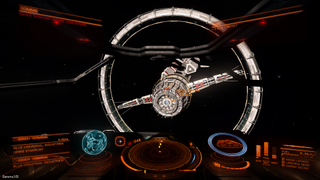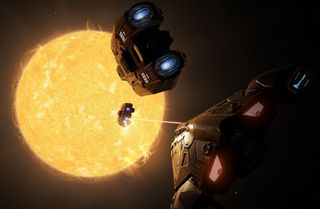Dying in Elite: Dangerous


In Why I Love, PC Gamer writers pick an aspect of PC gaming that they love and write about why it's brilliant. Today, Shaun marvels at the horribly lonely deaths in Elite: Dangerous.
These days I feel nauseous when I pick up a job in Elite: Dangerous. I sit in the cockpit, safely ensconced in my assigned station dock, and fret about the long distance ahead. I’m not afraid of getting shot to pieces by pirates, but I’m afraid of dying alone. That endless black outside—populated sparsely with hurtling unidentified signals and the occasional planet—is too much emptiness to bear.
Death in games is usually just a fail-state. Sometimes you fall into a hole, whimsical music plays and it’s mildly frustrating. Sometimes you’re punished with a gratuitously violent depiction of your character’s death, and it’s very funny. In games, death is usually a brief and unceremonious moment between one life and the next. We don’t learn about what it might be like to actually die, because that would not be fun.
I dearly love Elite: Dangerous, but I don’t think it’s very fun. I’ve been learning to play it for weeks and I still have no idea what I’m doing. I like taking goods from one station to another, but I don’t fancy shooting or being shot at. Elite: Dangerous is basically a beautiful interactive screensaver for me. I often play it while I’m doing something else. I set a course and occasionally check on my ship’s progress. I’m not playing the game properly, but I’m fine with that. I love the ambience. I love being in space.
The other day I was trying to play Elite: Dangerous properly. I had to pick up some cargo and take it somewhere else for some reason. Navigating the game’s galaxy map, I managed to frame shift drive into the right system and set a course for the right station without getting lost. For once I knew what I was doing, and the game sensed this, because it played some dramatic music as I soared towards my destination. It was like the climax to an epic space opera, but instead of saving the galaxy I was delivering crates of junk.

I didn’t end up dropping off my junk, though. Distracted by a bright light, and knowing that delivering my junk would mean docking (which I’m terrible at), I decided to investigate the former. Damn it, I’m no space courier anyway. The stars are my destination! How close can I get to them?
Stars and spaceships do not mix, I was soon to learn. Feeling reckless, and knowing no one in the entire galaxy would miss me if I were to die, and having achieved nothing anyway, I activated frame shift drive and set my course stubbornly for the centre of the star. I expected my ship to melt, or explode, and for dramatic music to punctuate the fatal drama, but none of that happened. A big red warning shrieked of my impending doom and then there was a large crushing bang. And then silence.
In real life I’m not particularly afraid of death. I figure it’s going to happen to everyone. There’s nothing special about me—I won't miraculously be the first person never to die—so I don't dwell on it. But Elite: Dangerous made me scared of death, both in-game and in real life.
The biggest gaming news, reviews and hardware deals
Keep up to date with the most important stories and the best deals, as picked by the PC Gamer team.
The thing about certain deaths in Elite: Dangerous is that they’re long, protracted, unceremonious deflations of life. They’re not glorious or heroic. They’re not dramatic. No one is there to say goodbye. You are whole solar systems away from anyone who might know your name. Your last moment is not the height of a grandiose crescendo: you just die.

Floating thousands of kilometres from the star, my ship was eerily silent: there was no engine sound, only a hum and the occasional beep of some system or alarm. I didn’t know what the beeps meant—still don’t—but I could see my windows fogging up gradually, and my breath was becoming increasingly laboured.
I was stranded. There was no way to fix the situation. I could either self-destruct or let nature take its course.
Choosing to do the latter, I was exposed to the only traumatic death I’ve ever experienced in a game. Death in Elite is traumatic because it's long. It took me four minutes to die, my pilot’s breath becoming increasingly emphysemic, his hands firmly gripping his controls, and then, as the beeps increased in intensity towards his final seconds of life, a powerful white light engulfed the screen. And that was the end. I felt dreadful, and scared.
Dying in Elite: Dangerous is not much fun. You can run out of fuel and have no recourse. Getting shot to pieces is quick and merciful. The worst deaths in Elite: Dangerous are when your ship is incapacitated and you’re just floating lonely in space. It’s a horrible, graphic death—more impactful than a slow motion decapitation or ragdoll flourish—and now I play the game in fear of it. I don’t want to get stranded. I don’t want to stuff it up. I want to live. I won’t be bull-rushing stars anymore, because now my simulated life feels precious.
Shaun Prescott is the Australian editor of PC Gamer. With over ten years experience covering the games industry, his work has appeared on GamesRadar+, TechRadar, The Guardian, PLAY Magazine, the Sydney Morning Herald, and more. Specific interests include indie games, obscure Metroidvanias, speedrunning, experimental games and FPSs. He thinks Lulu by Metallica and Lou Reed is an all-time classic that will receive its due critical reappraisal one day.
Most Popular

